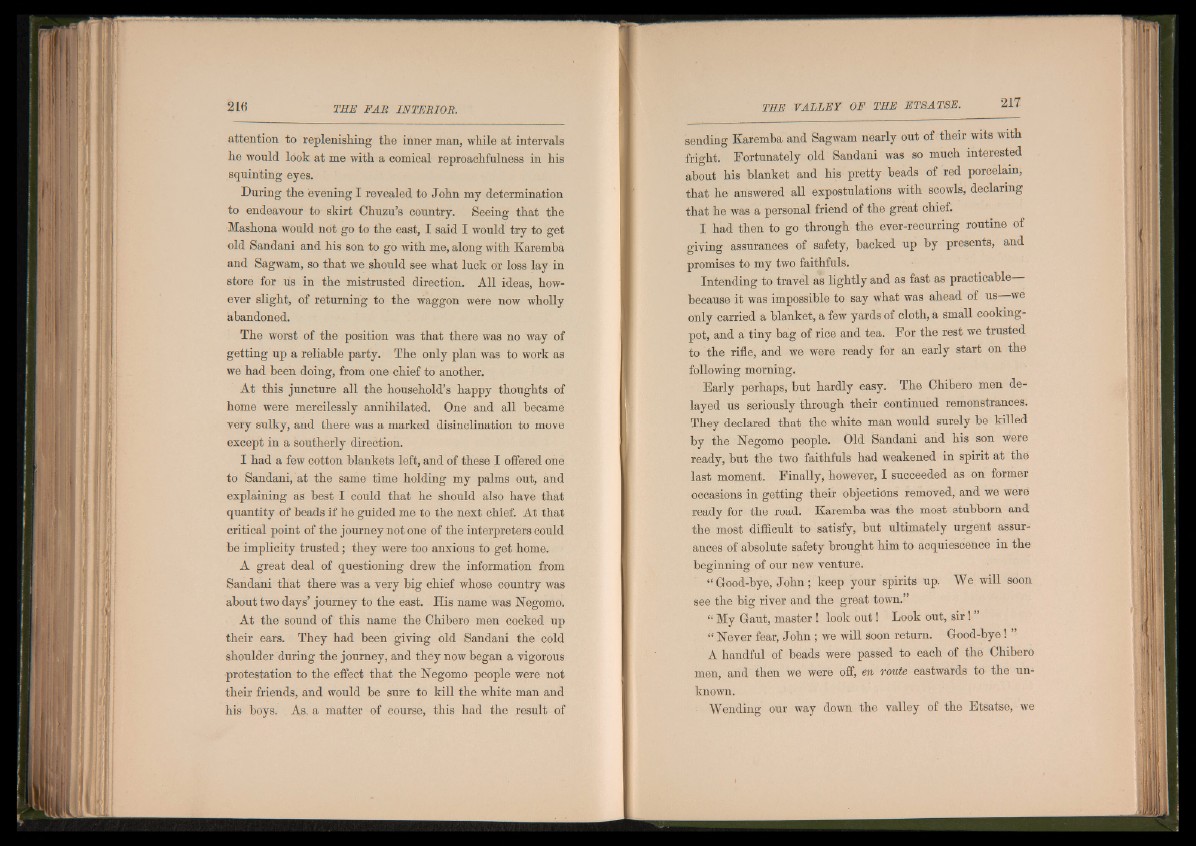
attention to replenishing the inner man, while at intervals
he would look at me with a comical reproachfulness in his
squinting eyes.
During the evening I revealed to John my determination
to endeavour to skirt Chuzu’s country. Seeing that the
Mashona would not go to the east, I said I would try to get
old Sandani and his son to go with me, along with Karemba
and Sagwam, so that we should see what luck or loss lay in
store for us in the mistrusted direction. All ideas, however
slight, of returning to the waggon were now wholly
abandoned.
The worst of the position was that there was no way of
getting up a reliable party. The only plan was to work as
we had been doing, from one chief to another.
At this juncture all the household’s happy thoughts of
home were mercilessly annihilated. One and all became
very sulky, and there was a marked disinclination to move
except in a southerly direction.
I had a few cotton blankets left, and of these I offered one
to Sandani, at the same time holding my palms out, and
explaining as best I could that he should also have that
quantity of beads if he guided me to the next chief. At that
critical point of the journey not one of the interpreters could
be implicity trusted; they were too anxious to get home.
A great deal of questioning drew the information from
Sandani that there was a very big chief whose country was
about two days’ journey to the east. His name was Negomo.
At the sound of this name the Chibero men cocked up
their ears. They had been giving old Sandani the cold
shoulder during the journey, and they now began a vigorous
protestation to the effect that the Negomo people were not
their friends, and would he sure to kill the white man and
his boys. As, a matter of course, this had the result of
sending Karemba and Sagwam nearly out of their wits with
fright. Fortunately old Sandani was so much interested
about his blanket and his pretty beads of red porcelain,
that he answered all expostulations with scowls, declaring
that he was a personal friend of the great chief.
I had then to go through the ever-recurring routine of
giving assurances of safety, backed up by presents, and
promises to my two faithfuls.
Intending to travel as lightly and as fast as practicable
because it was impossible to say what was ahead of us we
only carried a blanket, a few yards of cloth, a small cooking-
pot, and a tiny bag of rice and tea. For the rest we trusted
to the rifle, and we were ready for an early start on the
following morning.
Early perhaps, but hardly easy. The Chibero men delayed
us seriously through their continued remonstrances.
They declared that the white man would surely be killed
by the Negomo people. Old Sandani and his son were
ready, but the two faithfuls had weakened in spirit at the
last moment. Finally, however, I succeeded as on former
occasions in getting their objections removed, and we were
ready for the road. Karemba was the most stubborn and
the most difficult to satisfy, but ultimately urgent assurances
of absolute safety brought him to acquiescence in the
beginning of our new venture.
“ Good-bye, John; keep your spirits up. We will soon
see the big river and the great town.”
“ My Gaut, master ! look o u t! Look out, s ir! ’
“ Never fear, John ; we will soon return. Good-bye! ”
A handful of beads were passed to each of the Chibero
men, and then we were off, en route eastwards to the unknown.
- Wending our way down the valley of the Etsatse, we